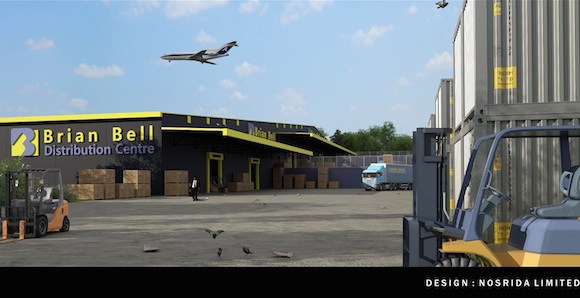The Brian Bell Group is a diversified retail conglomerate that is one of Papua New Guinea’s oldest companies. Executive Director Ian Clough tells Business Advantage PNG that the company will continue to grow by identifying areas of opportunity.

An artist’s impression of the Brian Bell distribution centre in Gerehu. Source: Brian Bell Group
‘We have slowly expanded the business from being a gun shop on Ela Beach 58 years ago, before moving into white goods and kitchen appliances, through to where we are now,’ says Clough.
‘For example, we are now the Nike agent in Papua New Guinea. We have now been the Kubota farming and agricultural equipment agent in PNG for the last couple of years. We produce our own bed linen and bed coverings on site in PNG, where we buy raw materials and produce quality linen.’
Clough says the strategy has been first to identify whether there is an opportunity in the market, then to assess whether or not there is the capacity to take the business in that direction.
‘The company has developed a strong geographical spread.’
‘I expect that over the next 18 months, or two years, the business will look towards different areas of opportunity as [newly-appointed Chief Executive] Cameron Mackellar and I work together on where there may be potential holes in the market.
‘Or where there might be others playing in the space but they potentially don’t have the logistics capacity that we may have.’
Spread

Brian Bell’s Ian Clough
The company has developed a strong geographical spread, says Clough. The Group has Homecentre divisions in most major locations across the country, and Trade Electrical divisions in three-quarters of these locations. The company has standalone Chemicals divisions in Port Moresby and Lae.
Clough says the company also has an ‘extensive dealer network’ based on long standing relationships with major retailers in some of the smaller locations.
‘These dealers buy product exclusively available from Brian Bell through our supply channels. This gives us the ability to sell our product in their locations and our dealers the opportunity to compete with our brand support”.
‘It also gives us more strategic reach than we otherwise would have without setting up the infrastructure’.
‘We will openly talk about the fact that we are not always the cheapest product in the market.’
‘Within our relationship comes a logistic network with transport, shipping, and all the key support networks including our relationships up into the Highlands and out to the islands’.
Brand

A Brian Bell longevity of service celebration Source: Brian Bell
Maintaining the company’s brand is critical to sustaining a diversified business, says Clough. ‘I think we never underestimate our brand; one of the things the Brian Bell group has built its brand on is quality and service.
‘We will openly talk about the fact that we are not always the cheapest product in the market and nor do we want to be. But we do want to offer great value.
‘Value is an interesting equation. We will always target the quality offer that we can provide ongoing service to.
‘If our customers spend a little bit more with us they know they will get a better product or, if something goes wrong with that product, they will be supported post-purchase.
‘Even though we have operational divisions out in the market that the customer sees, a lot of the centralised functions are managed internally in the one spot.’
‘Over the next couple of years, as we challenge ourselves to expand based on opportunity, that quality and service mantra is almost a cornerstone of what we are doing.’
Economies of scope
A key to the Brian Bell strategy is the pursuit of economies of scope: achieving efficiencies by operating in different markets. That requires a mixture of decentralisation and centralisation.
‘Even though we have operational divisions out in the market that the customer sees, a lot of the centralised functions are managed internally in the one spot. It is almost like a shared service model.
‘That allows us to then narrow the focus of the business and let the operators in each of the divisions trade and engage with customers. We can manage all of the central functions around HR, finance, and so on, centrally.
‘That wasn’t always the case six or seven years ago. This shift has been some of the reason for our recent success. The team have been able to streamline some of our operations as a result.’


